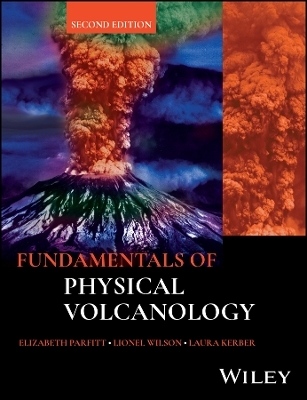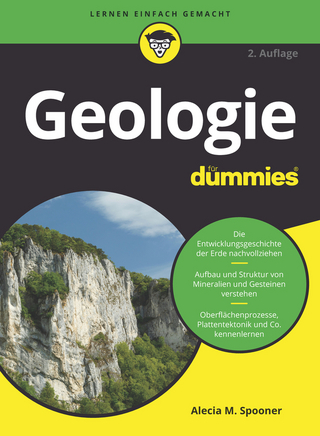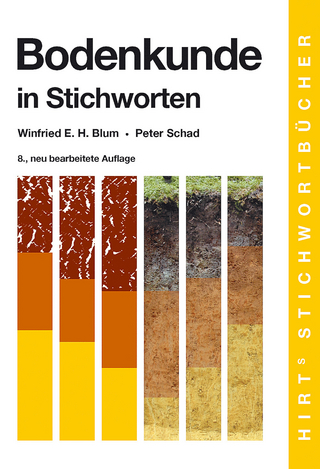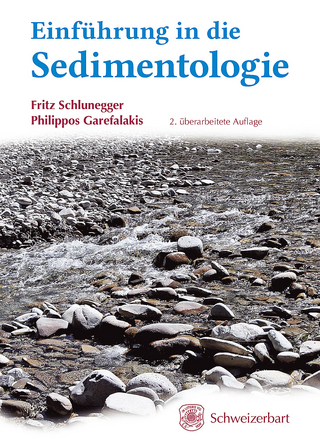
Fundamentals of Physical Volcanology
John Wiley & Sons Inc (Verlag)
978-1-119-26641-9 (ISBN)
- Noch nicht erschienen (ca. Februar 2025)
- Versandkostenfrei innerhalb Deutschlands
- Auch auf Rechnung
- Verfügbarkeit in der Filiale vor Ort prüfen
- Artikel merken
In the newly revised second edition of Fundamentals of Physical Volcanology, the authors provide a comprehensive introduction to the processes that control when and how volcanoes erupt. The book addresses all aspects of modern volcanology, from petrology and geochemistry to rock physics, fluid dynamics and thermodynamics.
With the help of new and improved illustrations, this new edition explains eruption types and mechanisms, subsurface processes, volcanic eruption products, and how volcanoes affect their surrounding environment.
Readers will also find:
Quantitative treatment of physical volcanological processes
A review of the historical development of volcanology
Examples of current research trends and topics in volcanology
Perfect for undergraduate earth sciences students around the globe, Fundamentals of Physical Volcanology will also earn a place in the libraries of researchers in related fields seeking an accessible introduction to the principles of physical volcanology.
Elisabeth Parfitt was an Honorary Research Fellow at Lancaster University in the United Kingdom and was a Faculty Member at the University of Leeds, as well as the State University of New York in Buffalo, United States. Lionel Wilson is Head of the Planetary Science Research Group in the Environmental Science Department at Lancaster University, UK. He is also a Visiting Professor at the University of Hawaii and Brown University in the United States. Laura Kerber is a Research Scientist at the Jet Propulsion Laboratory at the California Institute of Technology. She earned her doctorate in geology from Brown University.
1. Volcanic systems Introduction Styles of volcanic eruptions Volcanic systems The structure and aims of this book Further reading / Questions to think about
2. Magma generation and segregation Introduction Rock-melting mechanisms Volcanism and plate tectonics Melting and melt segregation in the mantle Summary / Further reading / Questions to think about
3. Magma migration Introduction Diapiric rise of melt The change from diapir rise to dike formation Dike propagation Trapping of dikes Consequences of dike trapping Summary / Further reading / Questions to think about
4. Magma storage Introduction Evidence for magma storage within the crust Formation and growth of magma chambers Magma chambers and their impact on volcanic systems Summary / Further reading / Questions to think about
5. The role of volatiles Introduction Volatiles in magma The solubility of volatiles in magma Bubble nucleation Bubble growth Influence of volatiles on magma dynamics Magma fragmentation and the influence of volatiles on eruption styles Summary / Further reading / Questions to think about
6. Steady explosive eruptions Introduction Influence of gas bubbles prior to magma fragmentation Acceleration of the gasmagma mixture Controls on exit velocity Eruption plumes in steady eruptions Fallout of clasts from eruption plumes Unstable eruption columns Summary / Further reading / Questions to think about
7. Transient volcanic eruptions Introduction Magmatic explosions Transient eruptions involving external water Summary / Further reading / Questions to think about
8. Pyroclastic falls and pyroclastic density currents Introduction Fallout of clasts from eruption columns The application of eruption column models Pyroclastic density currents and their deposits Summary / Further reading / Questions to think about
9. Lava flows Introduction Origin of lava flows Types of lava flow Lava flow rheology Rheological control of lava flow geometry Lava flow motion Lengths of lava flows Surface textures of lava flows Effects of ground slope and lava viscosity Summary / Further reading / Questions to think about
10. Eruption styles, scales, and frequencies Introduction Chemical composition and styles of volcanic activity Chemical composition and effusive eruptions Chemical composition and explosive eruptions Summary of compositional controls on eruption character Magnitudes and frequencies of volcanic eruptions Elastic and inelastic eruptions and the contribution of "mush" Eruptions of exceptional magnitude Summary / Further reading / Questions to think about
11. Volcanic hazards and volcano monitoring Introduction Types of volcanic hazard Hazard assessment Monitoring volcanoes and short-term eruption prediction Hazard mitigation Summary / Further reading / Questions to think about
12. Volcanoes and climate Introduction Evidence for the impact of volcanic eruptions on climate Satellite monitoring of climate change after volcanic eruptions The effects of volcanic eruptions on climate Volcanoes and mass extinctions Summary / Further reading / Questions to think about
13. Volcanism on other planets Introduction Volcanically active bodies in the Solar System The effects of environmental conditions on volcanic processes The Moon Mars Venus Mercury Io Europa Differentiated asteroids Summary / Further reading / Questions to think about
Answers to questions Index
| Erscheinungsdatum | 01.07.2019 |
|---|---|
| Verlagsort | New York |
| Sprache | englisch |
| Maße | 189 x 246 mm |
| Themenwelt | Naturwissenschaften ► Geowissenschaften ► Geologie |
| ISBN-10 | 1-119-26641-6 / 1119266416 |
| ISBN-13 | 978-1-119-26641-9 / 9781119266419 |
| Zustand | Neuware |
| Haben Sie eine Frage zum Produkt? |
aus dem Bereich


